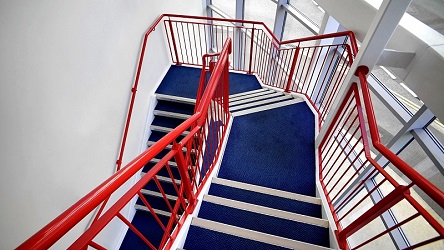
Knowing the differences and weighing each material’s pros and cons will help you choose between aluminum or stainless steel railing for your needs.
When choosing a railing system, you’re likely going to end up with a material that you already come into contact with on a near-daily level. Two such materials are aluminum and stainless steel. As far as railing materials go, these are some of the most common that are used on a variety of jobs and are both excellent building materials in their own right. Both are practical, easy to clean, and very functional— but you may need some help in understanding what the differences between aluminum and stainless steel railing really are.
Their Weight
For anyone who DIYs, or if you just want a job done very quickly, the weight of the materials you’re working with may matter to you. Aluminum is incredibly lightweight, which is why we see it used in airplanes and buildings. A majority of the world’s skyscrapers are mostly aluminum at their heart! Stainless steel railing can end up being very heavy, which makes it unwieldy to install, though that may not be a big enough reason to discourage considering stainless steel.
How Strong They Are
Both of these materials are metals, which means they’re plenty strong. That said, typically steel is going to be a lot stronger. Because of the weight we just discussed, though, aluminum has a better strength to weight ratio. If you’re looking for something sturdy and weight isn’t a concern, stainless steel railing may be right for your application.
What They Cost
Aluminum can help you save a pretty penny, but both are very affordable materials. This is in part because they’re such highly recyclable materials that are environmentally-friendly. Take a look around and you’ll see that both materials can be found at a price that is enticing for builders and consumers alike.
Resisting Corrosion
Both of these materials have some corrosion-resistant properties, although stainless steel is generally more reliable thanks to the chromium it contains. This basically adds an extra layer of protection against corrosion, meaning that when the material does rust, the protective layer takes most of the damage—meaning you’re left with shiny stainless steel once the rust is removed. Aluminum does not rust, but it can still corrode into aluminum oxide.
Conductive Metals
Stainless steel isn’t a good conductor, whereas aluminum does great at conducting temperatures and electricity. This is why aluminum is used in cars and air-conditioning units. Aluminum can end up getting quite hot or cold during extreme weather, whereas stainless steel likely will not. In an outdoor setting, where temperatures vary often, stainless steel railing will probably feel more comfortable to grip.
HAVE QUESTIONS? ASK HERCULES CUSTOM IRON
If you are ready to install your massive duty iron fence and add iron railings or you still have some more questions, we here at Hercules Custom Iron are here to help. We have many years of experience and will ensure that your chain link fence will serve you and your family for years. Visit us online or call us at 1-800-331-2590. For advice, updates, and to see what we are up to, be sure to follow us on social media on Facebook, Twitter, LinkedIn, YouTube, and Pinterest.


